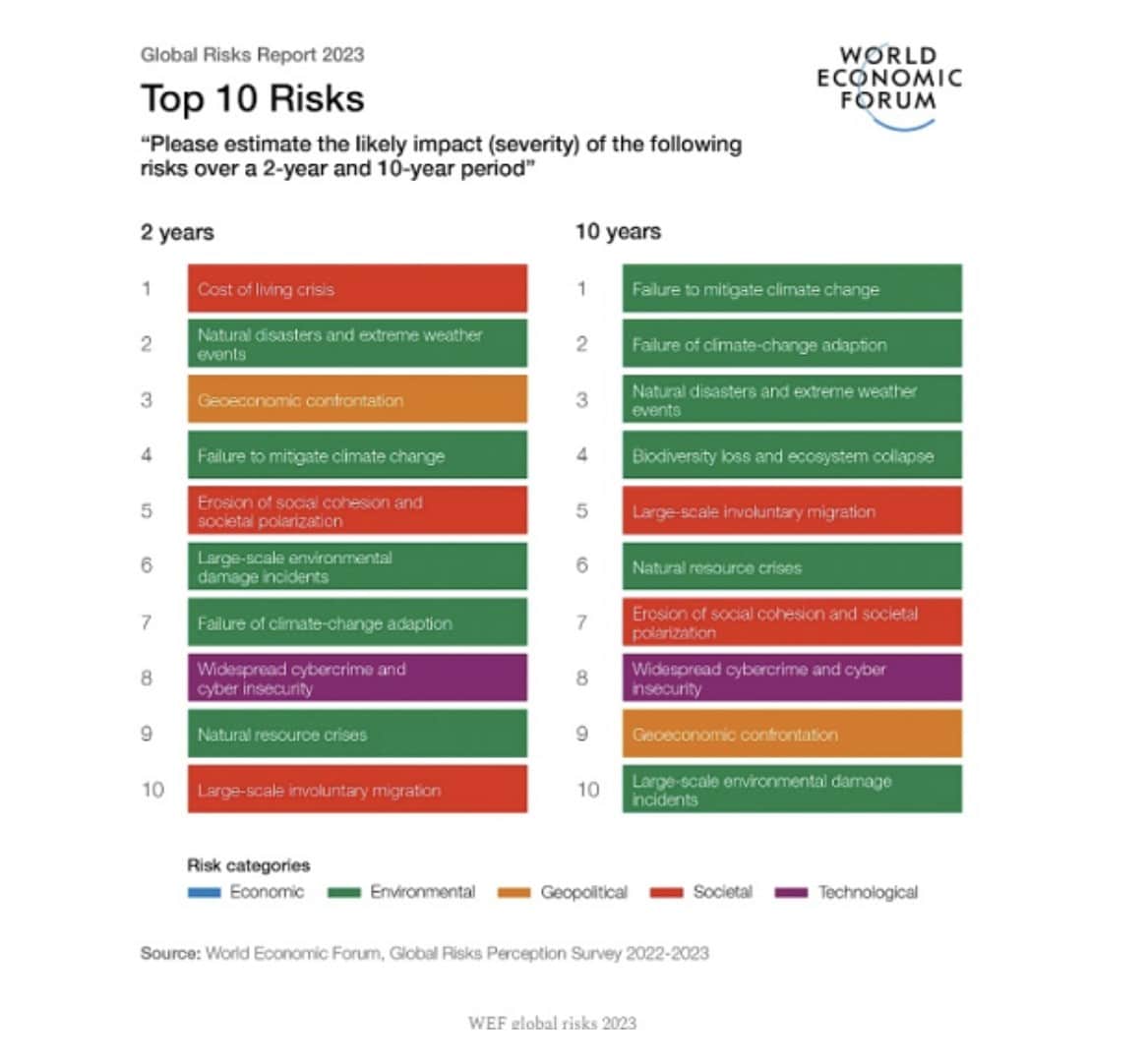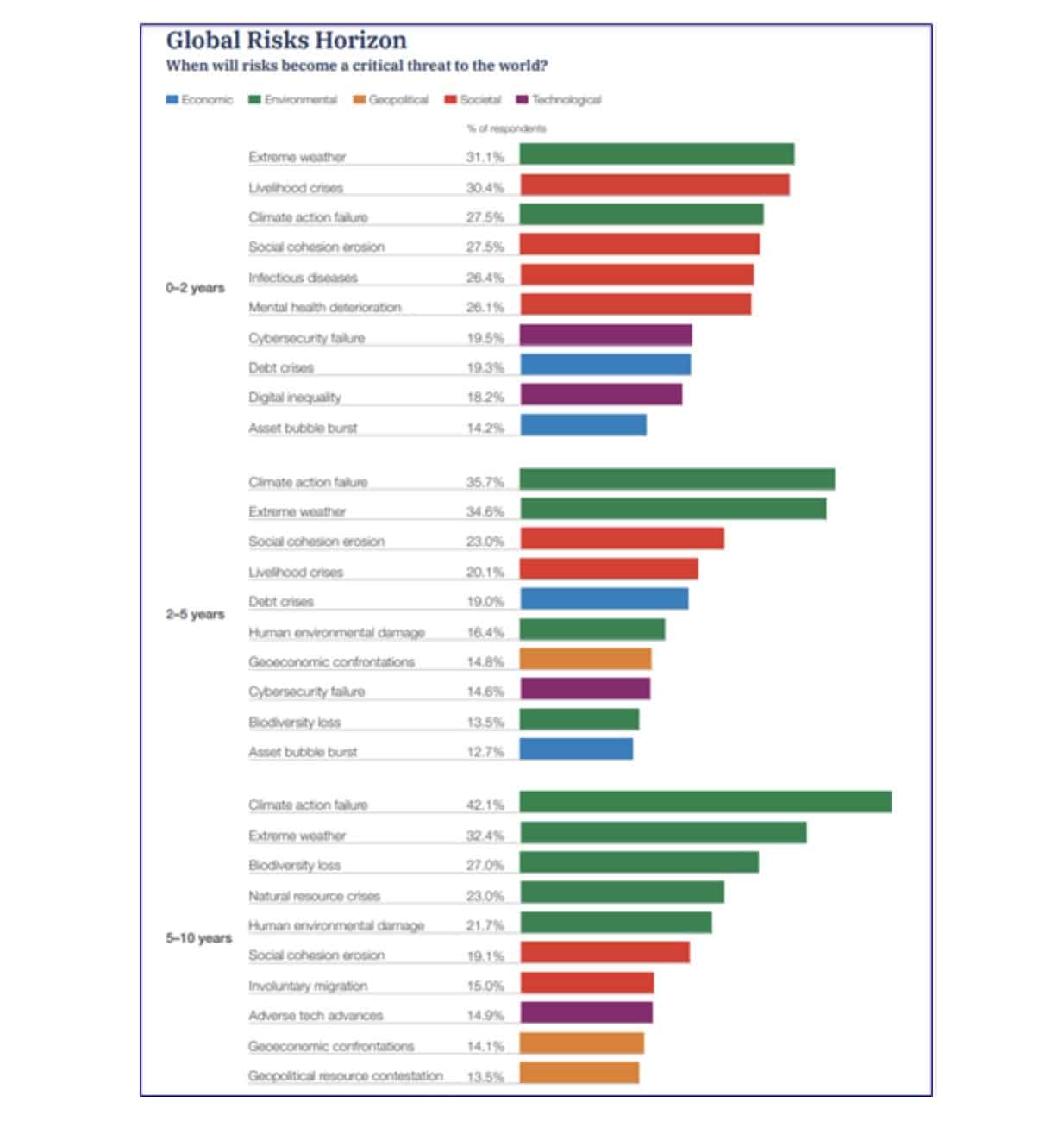(LifeSiteNews) — Since World Economic Forum (WEF) founder Klaus Schwab announced in 2019 that “[w]hat the fourth industrial revolution will lead to is a fusion of our physical, digital, and biological identity,” the annual meetings of the globalist organization in Davos have broadly focused on this agenda for the future. What does this mean?
The WEF publishes a Global Risks Report before every meeting, which usually takes place in January each year. This year they have reduced their risk forecasts from the two-, five-, and ten-year model of previous years to a simpler prediction of the threats facing the world over the next two and ten years.
If we compare this to previous years we see an emphasis on environmental catastrophe, which adumbrates issues such as societal collapse and soaring inflation.
It is curious that the sample population for these polls sees the arguments of Greta Thunberg as more compelling than the fact their own minds, homelands, and economies have been ruined by the policies of the managerial class who govern them. The environmental concerns do not reflect those of ordinary people. The first objection to the agenda of the WEF, as stated here, is that of a credibility gap. Who are these people whose concerns exclude the most obvious objections to government policies?
No mention of the cost of bad governance
In a recent survey, 97 percent of Hungarians opposed the sanctions on Russia. No other Western nation has bothered to ask their populations whether they support the nine rounds of sanctions which have fuelled soaring inflation with no end in sight. Sensitively termed a “Cost of Living Crisis” by the WEF, it is more honestly termed a “Cost of Policy Crisis,” as it is entirely due to government decision making on debt, on lockdowns, and on the self-defeating rounds of sanctions on Russia.
Sanctions have also failed to destroy Iran over a longer time scale, and have plainly not caused the collapse of Russia. The response of the U.S.-led West has been to talk up nuclear brinkmanship. The infamous Doomsday clock, long seen as an indicator of the likelihood of nuclear war, stands at 100 seconds to midnight, with the Bulletin of Atomic Scientists to announce an update on January 24. Tellingly, no mention is made in the forecasts of the WEF of the impact of a nuclear war.
Silence on the deficits
The WEF is, of course, inspired by the kind of posthuman futurism popularised by people such as Yuval Noah Harari. Presaging a future in which humans effectively become cybernetic organisms, the idea is that in order to best survive we should prepare to be dehumanised in significant ways. There is simply no argument for this nightmarish vision without a compelling emergency. It is for this reason the WEF promotes climate alarmism to the top of its Global Risks Agenda.
The posthuman project is not confined to dystopian visions of implants, social credit systems, a total surveillance state, and the abolition of private property and privacy. It is an ideology which includes the rejection of every meaningful dimension of human experience beyond the self and its desires. The rejection of God, notably by the omission of any mention of Christianity from the constitution of the European Union, is one aspect of the posthuman agenda. Another is moral inversion, which is the result of the abolition of any wider moral framework than individual desire.
The moral decline of the West, and the mental health costs of screen-based socialization, is a genuine crisis of humanity. Rather than being framed as the consequence of a form of governance increasingly reliant on the very technology which is destroying human scale relationships, this is seen by the WEF as an opportunity to usher in a posthuman, cybernetic future involving blanket biometric surveillance and the permanent fusion of humanity with machines.
The origins of the World Economic Forum
The WEF was not the brainchild of Klaus Schwab, but was, like Facebook itself, initially a creation of the U.S. National Security State. The idea of the World Economic Forum emerged from a broader movement of technocratic post-industrial theorists in the late 1960s, whose chief concern was the use of technology to better manage future populations.
It was people such as Henry Kissinger, John Kenneth Galbraith, and Herman Kahn who, through the Nixon-era Council on Foreign Relations, first travelled to Europe with Schwab in 1970 to recruit the future membership of the World Economic Forum. The result was the first European Management Forum, as it was then called. Schwab himself admitted this in a New York Times piece on Davos in 1997:
‘I got John Kenneth Galbraith, Herman Kahn and a few other people I had met in Cambridge to come and explain,’ he said, and with a staff of two secretaries and an assistant he later married, he organized the first European Management Symposium in 1971. It attracted 444 business leaders, each paying a substantial fee.
According to the above article by John Vedmore:
Kissinger would introduce Klaus Schwab to John Kenneth Galbraith at Harvard and, as the 1960s came to a close, Galbraith would help Schwab make the World Economic Forum a reality.
Vedmore noted that Kissinger’s involvement continued:
Years later, Henry Kissinger would make the opening address of the World Economic Forum’s 1980 conference, telling the elites at Davos: ‘For the first time in history, foreign policy is truly global.’
Why Davos?
The WEF meets in Davos, Switzerland. It is the highest town in the Alps, at 1560 metres above sea level. Klaus Schwab reportedly “chose Davos as the home for the annual meeting for the escape from the everyday that the mountains represent in Swiss and German culture, most famously captured in the novel ‘The Magic Mountain.’”
In Thomas Mann’s book, the magic of the mountain is not one of natural beauty but moreover a series of occult themed fantasies taking place in a sanatorium. The novel is set in an isolated refuge from reality, populated by obvious tropes of contemporary society blended with mythological allegories. A kind of safe space, or asylum, it seeks to fuse a fantastical past with the politics of the present, giving form to a future vision of humanity beyond the troubles of the time.
Strange magic
The magic of this mountain is appealing to those casting the spells, but far less so to those on the receiving end of the technological fantasies of the World Economic Forum. It appears to exist to promote a sense of urgent crisis, presenting itself as the necessary remedy. It seeks to solve the problems of humanity by removing much of the human dimension, and promotes a Godless world where the destruction of our way of life is marketed as a positive and breathtaking step into the future. To ascend this magic mountain then is to gain the view of the WEF, which appears to see humanity itself as a problem to be solved.
Many of the concerns of ordinary people do not feature at all in the global risk analysis of the WEF. Most telling is the absence of the WEF itself from the top ten list of causes for concern. In its ambitions, methods, and aims there is arguably a greater existential threat to humanity than any posed by the weather.
Source: Here’s what World Economic Forum leaders hope to push at this year’s Davos conference – LifeSite


